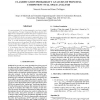Free Online Productivity Tools
i2Speak
i2Symbol
i2OCR
iTex2Img
iWeb2Print
iWeb2Shot
i2Type
iPdf2Split
iPdf2Merge
i2Bopomofo
i2Arabic
i2Style
i2Image
i2PDF
iLatex2Rtf
Sci2ools
109
click to vote
ICPR
2004
IEEE
2004
IEEE
Classification Probability Analysis of Principal Component Null Space Analysis
In a previous paper [1], we have presented a new linear classification algorithm, Principal Component Null Space Analysis (PCNSA) which is designed for problems like object recognition where different classes have unequal and non-white noise covariance matrices. PCNSA first obtains a principal components space (PCA space) for the entire data and in this PCA space, it finds for each class `? ', an ??? dimensional subspace along which the class's intra-class variance is the smallest. We call this subspace an Approximate Null Space (ANS) since the lowest variance is usually "much smaller" than the highest. A query is classified into class `? ' if its distance from the class's mean in the class's ANS is a minimum. In this paper, we discuss the PCNSA algorithm more precisely and derive tight upper bounds on its classification error probability. We use these expressions to compare classification performance of PCNSA with that of Subspace Linear Discriminan...
Related Content
| Added | 09 Nov 2009 |
| Updated | 09 Nov 2009 |
| Type | Conference |
| Year | 2004 |
| Where | ICPR |
| Authors | Namrata Vaswani, Rama Chellappa |
Comments (0)

